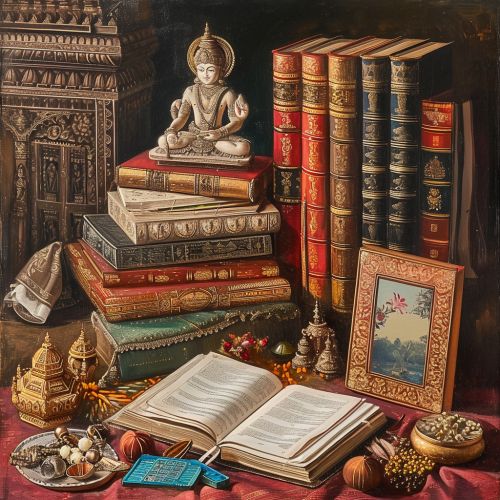Vedanta
Introduction
Vedanta, also known as Uttara Mimamsa, is a significant school of Hindu thought. It is primarily focused on the philosophical teachings and ideas found in the Upanishads, but also incorporates insights from the Brahma Sutras and the Bhagavad Gita. Vedanta is not a single philosophy, but a group of related philosophies that interpret the teachings of these texts.


Origins and Development
The term "Vedanta" is derived from two Sanskrit words: "Veda" meaning knowledge and "anta" meaning end. Thus, Vedanta literally translates to "the end of knowledge" or "the ultimate knowledge". The origins of Vedanta can be traced back to the later part of the Vedic period when the Upanishads, the concluding portions of the Vedas, were composed.
The development of Vedanta philosophy was significantly influenced by the teachings of the Upanishads, which are considered the foundational texts of Vedanta. These texts introduced the concept of Brahman, the ultimate reality, and Atman, the individual self, which are central to Vedanta philosophy.
Core Concepts
Brahman
In Vedanta, Brahman is considered the ultimate reality or the absolute truth. It is described as infinite, eternal, and beyond human comprehension. Brahman is not an impersonal force, but a transcendent and immanent reality.
Atman
Atman, in Vedanta philosophy, refers to the individual self or soul. It is considered eternal and divine. Vedanta teaches that Atman is not separate from Brahman, but is in fact identical with it. This concept is encapsulated in the famous Upanishadic statement "Tat Tvam Asi" (That Thou Art).
Maya
Maya is a complex concept in Vedanta, often translated as illusion or ignorance. It is the power that makes the world appear real to the senses. According to Vedanta, the world as we perceive it is not the ultimate reality but a product of Maya.
Schools of Vedanta
There are several sub-schools of Vedanta, each with its own interpretation of the Vedanta texts. The three most prominent schools are Advaita Vedanta, Vishishtadvaita Vedanta, and Dvaita Vedanta.
Advaita Vedanta
Advaita Vedanta, propagated by the philosopher Adi Shankara, is the most well-known school of Vedanta. It proposes the theory of non-dualism, asserting that there is no difference between Brahman and Atman.
Vishishtadvaita Vedanta
Vishishtadvaita Vedanta, espoused by Ramanuja, is a school of qualified non-dualism. It posits that the individual soul and the material world are real, but they are also part of Brahman.
Dvaita Vedanta
Dvaita Vedanta, founded by Madhva, is a school of dualism. It maintains a clear distinction between Brahman and the individual souls.
Impact and Influence
Vedanta has had a profound impact on Hindu thought and culture. It has influenced various aspects of Hindu society, including its religious practices, art, literature, and social structure. Vedanta has also had a significant influence on other religions and philosophies, both within and outside India.
See Also
Upanishads Brahma Sutras Bhagavad Gita Hindu Philosophy Adi Shankara Ramanuja Madhva
